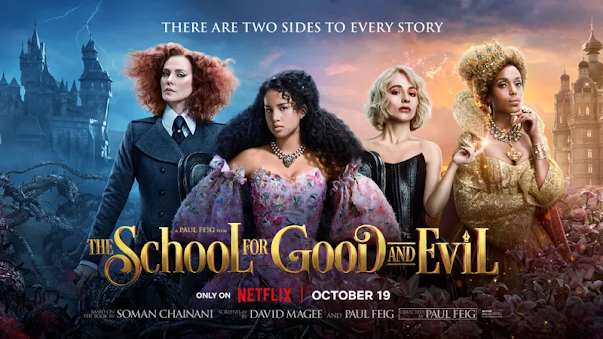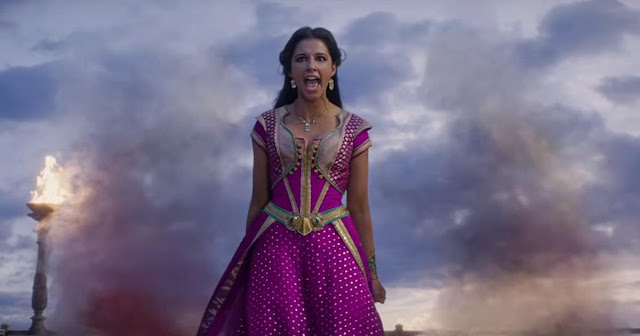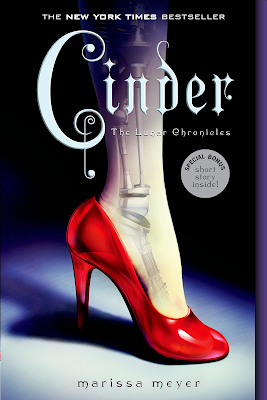How Princesses Represent Hope
The final trailer was just released for Disney's latest fairy tale endeavor, The Nutcracker and the Four Realms. This trailer gives audiences more insight to the content of the four realms of snowflakes, flowers, sweets, and the creepy distorted land that was taken over by the movie's villain, Mother Ginger. The trailer also confirmed that the man with the eyepatch from the previous trailer was in fact Clara's godfather, Drosselmeyer. While it still hasn't been confirmed in the dialogue that the soldier accompanying Clara in the trailers is Drosselmeyer's nephew, the Nutcracker turned human, it's fairly obvious at this point. Some people have commented that this movie looks like a remake of Tim Burton's 2010 live-action Alice in Wonderland. Both portray a classic heroine donning the uniform of a soldier to save an enchanted realm from evil. This feminist answer to the "one man's journey" trope brings in a new era that shifts the method in which princesses represent hope in fantasy stories, a role that they have played for centuries.
Clara's status as a princess in this movie was established in the previous trailer even though it diverges from the original fairy tale. Her late mother created the four realms and is therefore considered their queen. As her offspring, Clara inherits the title of "Princess" along with the responsibility of saving the realms from Mother Ginger after her mother's death. We see additional footage of her in her soldier dress in this trailer as well as a brief demonstration of her knowledge of physics. Even though Clara was not aware of the enchanted realms, her destiny was set for her before she was born, and she must now finish what her mother started. In this way, her more metaphorical role as a princess isn't all that different from what it means to be a princess historically. Princesses are born into royal blood lines and are destined to either rule a kingdom or marry into an alliance that will promise peace between other kingdoms. The decline of femininity in modern media has mitigated the importance of marriage in fairy tales, so princesses must now take on a more active role in ensuring the future of their kingdoms, which is why Clara is seen as a soldier in this movie instead of being tailored into the role of the Nutcracker's future bride.
Princesses in fiction represent hope for the future in the same way that heroes do. That'sthe reason Auli'i Cravalho from Disney's Moana prefers to think of her character, the daughter of the village chief, as a heroine instead a princess. For better or worse, the term "princess" has a larger appeal to girls than "heroine," so that's the term that the media targeted toward girls prefers to use. It's also why the My Little Pony franchise made their most powerful characters princesses instead of queens. Princesses have always been a representation of the ideal female archetype. When Snow White ate the poison apple, the whole kingdom mourned for her. It was the death of the promise of a happy future under a kind and just queen. In the end, the prince revived her, restoring hope for the kingdom and the life of a pure, innocent, loving maiden. Today, princesses are more active in restoring that hope, but their significance to the lives of everyone living in their kingdom has not changed.
You might be wondering why Clara needs to be a princess when she played her role just fine as a little girl named Marie in the fairy tale and as an similar character in the ballet. What it all comes down to is princess culture in our society. The ideas of being perceived as beautiful inside and out, being loved by all, wearing beautiful clothes, and enjoying life are still ideal outcomes for girls today. All of these things are associated with princesses even though the finer details of what it means to be a princess have changed over the years. Therefore, calling Clara a princess makes The Nutcracker and the Four Realms more appealing to its target audience than if it was marketed as a retelling of "The Nutcracker." Would it change the story if they just call her "Clara" and leave all the other details in the script the same? Probably not. In the end, it's just a cleverly employed marketing device that allows them to tie this movie into their extremely successful Disney Princess franchise.
Today, princesses are synonymous with heroines in fiction. They embody all of the traits that make women outstanding and appealing. Clara from the new Nutcracker and the Four Realms trailer is no exception. She uses her intellect, strength, and predetermined destiny as the daughter of the woman who created the four realms to protect the magical land that she discovers. The Nutcracker and the Four Realms is coming to theaters on November 2nd. Even though it looks similar to a lot of other recent female-driven films, I'm eager to see what new twists they will place on the fairy tale as well as the lovely visuals portrayed in all of the trailers leading up to the final one released today.
Clara's status as a princess in this movie was established in the previous trailer even though it diverges from the original fairy tale. Her late mother created the four realms and is therefore considered their queen. As her offspring, Clara inherits the title of "Princess" along with the responsibility of saving the realms from Mother Ginger after her mother's death. We see additional footage of her in her soldier dress in this trailer as well as a brief demonstration of her knowledge of physics. Even though Clara was not aware of the enchanted realms, her destiny was set for her before she was born, and she must now finish what her mother started. In this way, her more metaphorical role as a princess isn't all that different from what it means to be a princess historically. Princesses are born into royal blood lines and are destined to either rule a kingdom or marry into an alliance that will promise peace between other kingdoms. The decline of femininity in modern media has mitigated the importance of marriage in fairy tales, so princesses must now take on a more active role in ensuring the future of their kingdoms, which is why Clara is seen as a soldier in this movie instead of being tailored into the role of the Nutcracker's future bride.
Princesses in fiction represent hope for the future in the same way that heroes do. That'sthe reason Auli'i Cravalho from Disney's Moana prefers to think of her character, the daughter of the village chief, as a heroine instead a princess. For better or worse, the term "princess" has a larger appeal to girls than "heroine," so that's the term that the media targeted toward girls prefers to use. It's also why the My Little Pony franchise made their most powerful characters princesses instead of queens. Princesses have always been a representation of the ideal female archetype. When Snow White ate the poison apple, the whole kingdom mourned for her. It was the death of the promise of a happy future under a kind and just queen. In the end, the prince revived her, restoring hope for the kingdom and the life of a pure, innocent, loving maiden. Today, princesses are more active in restoring that hope, but their significance to the lives of everyone living in their kingdom has not changed.
You might be wondering why Clara needs to be a princess when she played her role just fine as a little girl named Marie in the fairy tale and as an similar character in the ballet. What it all comes down to is princess culture in our society. The ideas of being perceived as beautiful inside and out, being loved by all, wearing beautiful clothes, and enjoying life are still ideal outcomes for girls today. All of these things are associated with princesses even though the finer details of what it means to be a princess have changed over the years. Therefore, calling Clara a princess makes The Nutcracker and the Four Realms more appealing to its target audience than if it was marketed as a retelling of "The Nutcracker." Would it change the story if they just call her "Clara" and leave all the other details in the script the same? Probably not. In the end, it's just a cleverly employed marketing device that allows them to tie this movie into their extremely successful Disney Princess franchise.
Today, princesses are synonymous with heroines in fiction. They embody all of the traits that make women outstanding and appealing. Clara from the new Nutcracker and the Four Realms trailer is no exception. She uses her intellect, strength, and predetermined destiny as the daughter of the woman who created the four realms to protect the magical land that she discovers. The Nutcracker and the Four Realms is coming to theaters on November 2nd. Even though it looks similar to a lot of other recent female-driven films, I'm eager to see what new twists they will place on the fairy tale as well as the lovely visuals portrayed in all of the trailers leading up to the final one released today.











Comments